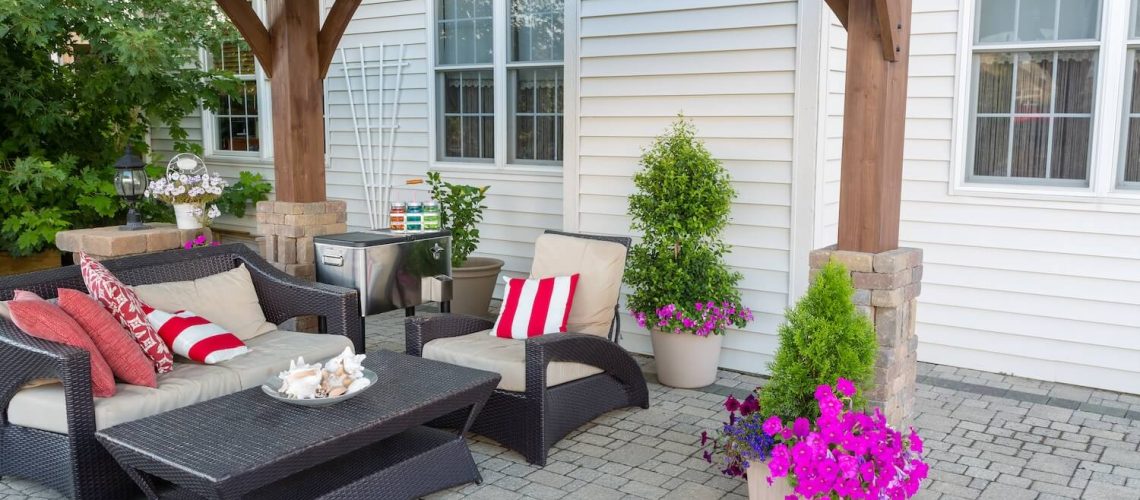Building a new home is an exciting venture, filled with decisions that can shape the look, feel, and functionality of your dream residence. Among these decisions, one that often comes up is whether to incorporate paving stones into your landscape design. Paving stones, also known as pavers, offer a versatile and durable solution for driveways, walkways, patios, and more. However, determining the right time to bring in a paving stone installer for your new home build can be crucial to achieving the best results.
In this article, we’ll explore the optimal timing and considerations for incorporating paving stones into your new home construction.
Why Choose Paving Stones?
Before diving into the timing of hiring a paving stone installer, it’s essential to understand the benefits of choosing paving stones for your home’s exterior surfaces:
- Versatility: Paving stones come in a variety of shapes, sizes, colors, and patterns, allowing for endless design possibilities.
- Durability: Pavers are known for their strength and longevity, making them a long-term investment for your home.
- Low Maintenance: Unlike poured concrete or asphalt, paving stones are easy to repair and replace if damaged.
- Enhanced Curb Appeal: Well-designed paving stone installations can significantly enhance the aesthetic appeal and value of your property.
Considerations for Timing
The timing of bringing in a paving stone installer for your new home build depends on various factors:
1. Phase of Construction:
- Pre-Construction: If you’re still in the planning or design phase of your new home, this is an ideal time to consult with a paving stone installer. They can provide valuable insights and recommendations on incorporating paving stones into your landscape design from the outset.
- During Construction: If your home build is already underway, it’s crucial to coordinate with your builder and paving stone installer to ensure seamless integration of the pavers with the construction timeline.
2. Weather Conditions:
- Ideal Seasons: Paving stone installation is best done in moderate weather conditions, typically during spring or fall when temperatures are mild and precipitation is minimal. Extreme heat or cold can affect the setting and longevity of the pavers.
- Avoid Rainy or Freezing Periods: Wet or frozen ground can complicate the installation process and compromise the quality of the finished product. It’s advisable to schedule paving stone installation during dry weather to ensure optimal results.
3. Access to the Site:
- Clear Site: Ensure that the construction site is accessible and free from any obstructions or ongoing construction activities that could hinder the paving stone installation process.
- Coordinated Effort: Coordinate with your builder, landscaper, and paving stone installer to schedule the installation at a time when it won’t interfere with other construction or landscaping activities.
Benefits of Early Paving Stone Installation
Opting for early paving stone installation in your new home build offers several advantages:
- Cost Savings: Incorporating paving stones into the initial construction phase can often be more cost-effective than retrofitting them later on. It allows for better planning and utilization of materials.
- Integrated Design: Early involvement of a paving stone installer ensures that the pavers are seamlessly integrated into the overall landscape design, enhancing the aesthetic and functional aspects of your outdoor spaces.
- Timely Completion: Scheduling paving stone installation early in the construction process helps in avoiding delays and ensures that the exterior surfaces are ready for use upon completion of your new home.
Choosing the Right Paving Stone Installer
When it comes to selecting a paving stone installer for your new home build, consider the following:
- Experience and Expertise: Look for a paving stone installer with a proven track record of quality workmanship and expertise in handling various types of pavers and installation techniques.
- Portfolio and References: Review their portfolio of past projects and ask for client references to gauge their level of professionalism and customer satisfaction.
- Licensing and Insurance: Ensure that the paving stone installer is licensed, bonded, and insured to protect yourself against any potential liabilities or disputes.
- Communication and Collaboration: Choose a paving stone installer who communicates effectively and collaborates closely with you, your builder, and other stakeholders to ensure a smooth and successful installation process.
Maintenance and Care
Once your paving stones have been installed, proper maintenance and care are essential to ensure their longevity and keep them looking their best. Here are some paver maintenance tips to consider:
1. Regular Cleaning:
- Sweeping: Regularly sweep the paved areas to remove leaves, debris, and dirt that can accumulate and cause staining or deterioration over time.
- Pressure Washing: Periodically pressure wash the paving stones to remove stubborn stains, moss, or algae growth. Use a mild detergent and avoid harsh chemicals that can damage the pavers.
2. Sealing:
- Protective Sealant: Apply a quality sealant to the paving stones to protect them from water damage, UV rays, and general wear and tear. This helps in preserving the color and integrity of the pavers.
- Frequency: Depending on the type of sealant used and the level of foot or vehicular traffic, reapply the sealant every 2-5 years to maintain optimal protection.
3. Repair and Replacement:
- Immediate Repairs: Address any cracks, chips, or uneven areas in the paving stones promptly to prevent further damage and maintain the structural integrity of the installation.
- Matching Pavers: Keep some extra pavers on hand to ensure a seamless repair or replacement process, maintaining the uniformity and aesthetic appeal of the paved areas.
4. Professional Maintenance:
- Annual Inspection: Schedule an annual inspection by a professional paving stone installer to assess the condition of the pavers and address any maintenance or repair needs.
- Professional Cleaning: Consider hiring a professional cleaning service specializing in paving stone maintenance to deep clean and rejuvenate the paved areas periodically.
Cost Considerations
When budgeting for paving stone installation as part of your new home build, it’s essential to consider the following cost factors:
1. Material Costs:
- Paver Selection: The cost of paving stones varies depending on the material, design, and quality. Popular options include concrete, natural stone, and brick pavers, with prices ranging from moderate to high-end.
- Additional Materials: Factor in the cost of base materials, edge restraints, joint sand, and sealant required for the installation.
2. Labor Costs:
- Installation Fees: The labor cost for paving stone installation depends on the complexity of the design, site preparation, and size of the paved area. Obtain multiple quotes from reputable paving stone installers to compare costs and services.
3. Maintenance Costs:
- Sealant and Cleaning: Include the cost of sealant, cleaning products, and professional maintenance services in your long-term budget to ensure the ongoing care and preservation of the paving stones.
Conclusion
Incorporating paving stones into your new home build can add beauty, functionality, and value to your property. By considering the timing, benefits, and choosing the right paving stone installer, you can ensure a seamless and successful installation that complements your dream home. Whether you’re in the initial planning stages or midway through construction, consulting with a outdoor living contractor early on and coordinating effectively with all parties involved will help you achieve the desired results and create an inviting outdoor space for years to come.

